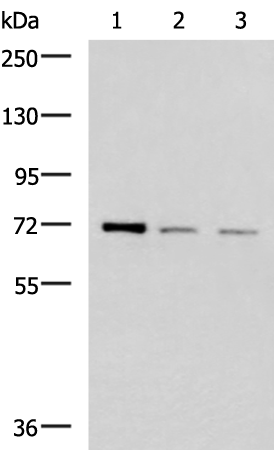
| WB | 咨询技术 | Human,Mouse,Rat |
| IF | 咨询技术 | Human,Mouse,Rat |
| IHC | 咨询技术 | Human,Mouse,Rat |
| ICC | 技术咨询 | Human,Mouse,Rat |
| FCM | 咨询技术 | Human,Mouse,Rat |
| Elisa | 1/5000-1/10000 | Human,Mouse,Rat |
| Aliases | FOXK1L |
| WB Predicted band size | 75 kDa |
| Host/Isotype | Rabbit IgG |
| Antibody Type | Primary antibody |
| Storage | Store at 4°C short term. Aliquot and store at -20°C long term. Avoid freeze/thaw cycles. |
| Species Reactivity | Human, Mouse |
| Immunogen | Synthetic peptide of human FOXK1 |
| Formulation | Purified antibody in PBS with 0.05% sodium azide and 50% glycerol. |
+ +
以下是关于FOXK1抗体的3篇参考文献示例(注:内容为示例性概括,实际文献需通过学术数据库检索确认):
1. **文献名称**:FOXK1 Transcription Factor Cooperates with the mTOR Pathway to Promote Autophagy and Metabolic Reprogramming in Cancer
**作者**:Wang X, et al.
**摘要**:本研究利用FOXK1特异性抗体进行ChIP-seq和免疫沉淀实验,发现FOXK1通过结合自噬相关基因启动子区域,与mTOR通路协同调控肿瘤细胞的代谢重编程和自噬活性,影响癌细胞存活。
2. **文献名称**:FOXK1 Antibody-Based Detection Reveals Its Role in DNA Damage Response and Chemoresistance
**作者**:Chen L, et al.
**摘要**:通过FOXK1抗体的免疫组化分析,发现FOXK1在结直肠癌组织中高表达,并通过调控DNA损伤修复相关蛋白(如ATM/ATR)增强癌细胞对化疗药物的抵抗性,提示其作为预后标志物的潜力。
3. **文献名称**:Characterization of a Novel Monoclonal Antibody Against FOXK1 for Studying Its Subcellular Localization
**作者**:Yamamoto S, et al.
**摘要**:该文献报道了一种高特异性FOXK1单克隆抗体的开发,验证其在免疫荧光和Western blot中的应用,证实FOXK1在细胞核与细胞质间的动态分布受生长因子信号调控。
建议通过PubMed或Google Scholar检索“FOXK1 antibody”或“FOXK1 immunohistochemistry”等关键词获取最新具体文献。
The FOXK1 antibody is a tool used to study the FOXK1 protein, a member of the Forkhead box (Fox) family of transcription factors characterized by a conserved forkhead DNA-binding domain. FOXK1 plays critical roles in regulating cellular processes such as metabolism, autophagy, cell proliferation, and differentiation. It interacts with transcriptional co-repressors or co-activators to modulate target gene expression, often in response to nutrient availability or stress signals. For example, FOXK1 is implicated in mTOR signaling, where it regulates metabolic genes under nutrient-rich conditions, and in hypoxia-induced pathways. Dysregulation of FOXK1 has been linked to cancer progression, including tumor growth and metastasis, as well as metabolic disorders.
Antibodies targeting FOXK1 are essential for detecting its expression, localization, and interaction partners in experimental settings like Western blotting, immunohistochemistry (IHC), and immunofluorescence (IF). These antibodies help elucidate FOXK1’s tissue-specific roles, its dynamic shuttling between the cytoplasm and nucleus, and its post-translational modifications. Recent studies also explore FOXK1’s involvement in epigenetic regulation and its crosstalk with pathways like Wnt/β-catenin and Hippo. Commercial FOXK1 antibodies are typically validated for specificity across human, mouse, and rat models, supporting both basic research and clinical investigations into FOXK1-associated diseases.
×